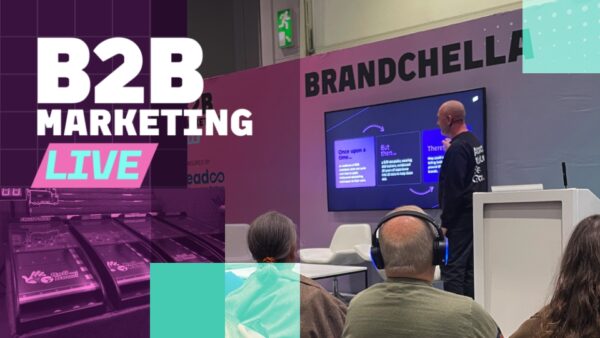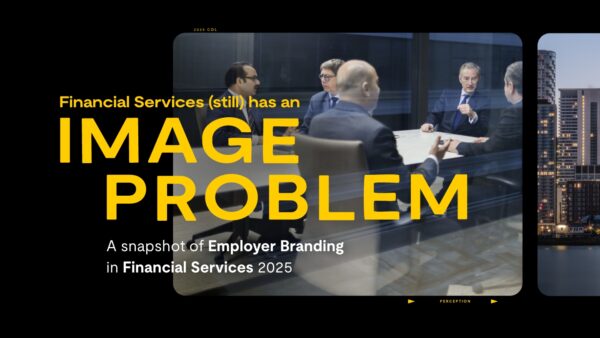Changemakers Conference 2025
When Sophie Devonshire, CEO of The Marketing Society, opened this year’s Changemakers Conference in Scotland, she challenged us with a simple task: find a new person nearby and share your biggest wins of the year.
The National Museum of Scotland’s auditorium then filled with conversation, energising the day with stories of everyday victories and big moves. This led us into this year’s theme, Challenge, and prepared us to reflect on how we, as marketeers can think bigger, braver and with more impact in the work we do.
 Svein Clouston, Caroline Olechowski and Dan Sullivan speaking at the 2025 Changemakers Conference.
Svein Clouston, Caroline Olechowski and Dan Sullivan speaking at the 2025 Changemakers Conference.
Redefining healthcare with Bupa’s Dan Sullivan
I may be biased, but one of my favourite moments came when Dan Sullivan, Product and Propositions Director at Bupa Insurance UK, joined our Co-Managing Director Svein Clouston and Strategy Director Caroline Olechowski for a conversation about redefining the health insurance category.
Dan shared how when he joined Bupa, he led a shift in Bupa’s messaging from focusing on the product to focusing on outcomes. With insight and data, Bupa worked with Rationale to identify growth-oriented SMEs who didn’t see themselves as “small” but as ambitious and forward-looking. That insight underpinned the award-winning campaign, ‘Let’s Get Growing’.
He also discussed ‘Only from Bupa’, a campaign that our team developed to showcase the unique benefits rooted in Bupa’s dual role as both an insurer and a healthcare provider.
Caroline and Dan touched on Bupa’s most recent innovative Genomics launch, which gives people actionable data to personalise their healthcare based on their genetic makeup. One particular use case is through their Medication Check, which reveals how our DNA shapes our response to common medications. Dan predicted that while private healthcare was once about accessibility, the future will be about longevity.
Navigating high-stakes conversations with David Kean
David Kean, co-founder of Catalyst started off with one of the most instantly actionable sessions of the day. He trained us in techniques for navigating high-stakes conversations from client negotiations to internal debates, with clarity, confidence and an eye on win-win situations.
He began with the neuroscience behind fear. Our amygdala, he explained, is designed to protect us from danger, but in professional settings, that same instinct can make us freeze, defend, or say something we regret. He put his techniques into practice by choosing somebody at random to pitch their company and as our heart rates elevated in fear of being picked, he guided us through a breathing exercise that had an immediate calming effect.
Going into negotiations, he urged the power of resisting the instinct to sell or defend your position. Instead, listening allows you to understand the other party’s concerns and ask directional, calibrated questions to help you address their concerns. David referenced a study that showed that the difference between a surgeon being sued and not sued was an average of 4 extra minutes during pre-surgery consultations. This extra time allowed patients to feel heard as the surgeons asked questions to understand their concerns and speak directly to address those concerns.
The most memorable part of his session was when he asked us to raise our hands as high as we could. Then, when he asked us to raise them 10% higher, we all could. He used this to illustrate the power of visualisation, and the fact that when we have a specific goal in mind, we are much more able to achieve it.
David showed us that effective communication, in business and beyond isn’t being the loudest voice, but about listening better.
 Dan Sullivan, Product and Propositions Director on how Bupa redefined the health insurance category.
Dan Sullivan, Product and Propositions Director on how Bupa redefined the health insurance category.
Rewriting the narrative on mental health with Ella Greenwood
Next, filmmaker and mental health advocate Ella Greenwood, Founder of Broken Flames Productions, took the stage with courageous honesty. She shared her personal experience of struggling with mental health as a teenager, and the absence of meaningful support at the time.
Without formal training, she used her love for film to rewrite how mental illness is portrayed in media. Too often, she said, it’s linked with violence, aggression, or danger.
Through her films like Smudged Smile and Why Wouldn’t I Be?, Ella is working to shift public perception. She shared startling statistics, that one in four people in the UK will experience a mental health struggle each year, and that 74% of suicides in the UK are male. But she also offered hope: storytelling can save lives.
As she screens her films at festivals and schools, she spoke about the responsibility filmmakers share in shaping how we understand mental health, especially for young people. For marketeers, the stories we tell and how we tell them have real impact, and it’s up to us to ensure that they don’t further stigmatise vulnerable populations.
Lessons from EasyJet’s revolution with Tony Anderson
Tony Anderson, former Marketing Director at easyJet, brought a dose of energy and humour to the stage, offering a behind-the-scenes look at how the airline disrupted the travel industry.
From its unapologetically bright orange branding to its infamous PR stunts, every decision was rooted in boldness and differentiation. One memorable stunt involved ten easyJet staff booking out the front seats on a new Ryanair route dressed head to toe in orange. It was cheeky, strategic, and unforgettable.
Tony explained that easyJet’s early success wasn’t just about price; it was about consistency and culture. He detailed how they broadcasted consistent messaging around flying out of Luton rather than Heathrow and not offering free in-flight meals to help their audience understand how they could be so cheap without compromising safety.
In addition to differentiation, Tony also noted their foresight into the digital revolution, focus on getting their culture right and consistently delivering on their brand promise as keys to success. Now, Tony is looking into sustainable aviation with Hybrid Air Vehicles, an innovative endeavour that could redefine how we think about travel.
Mastering the LinkedIn algorithm with Alicia Teltz
Alicia Teltz, former member of LinkedIn’s own team, gave us an inside look at how to grow personal and professional brands on the platform.
In just three months, she grew her own following to over 10,000 and gave insight on an optimised content mix:
- 70% top-funnel (industry news, broad inspiration),
- 25% mid-funnel (case studies and niche insights),
- 5% bottom-funnel (personal stories and calls to action).
She reminded us that LinkedIn is, above all, a business, so aligning with its commercial goals helps your content perform better. “If you post once a week,” she noted, “you’re already in the top 1% of LinkedIn users.”
Alicia’s framework wasn’t about vanity metrics but about trust. She cited research showing that 88% of buyers consider trust in their buying decisions. Her masterclass in personal branding showed how authenticity and valuable content can make LinkedIn one of your most effective trust-building tools with your audience.
Building machine-ready brands with Wayne Deakin
Creative leader Wayne Deakin, former Global Executive Creative Director at Wolff Olins, offered a fast-paced and fascinating talk on brand transformation in the age of AI.
“Brand,” he said, “is an articulation of culture.” He walked us through the visual story of Lloyds Bank’s rebrand and the repositioning of Sandals Resorts, showing how storytelling and emotion can set brands apart in categories dominated by sameness.
Wayne urged us to think of brand updates like operating system upgrades – continuous, living and evolving. “Don’t build brands,” he challenged us, “build worlds. We don’t want to buy into something; we want to belong to something.”
 7-time Emmy Award-winning comedian and writer, Beth Sherman.
7-time Emmy Award-winning comedian and writer, Beth Sherman.
The power of humour with Beth Sherman
Beth Sherman, Emmy Award-winning comedian and writer gave us a marketer’s dream: a framework and an acronym. Her “BETH” model shows how humour can build trust and drive action.
- Brevity – Saying something in as few words as possible.
- Elephant – Acknowledging the elephant in the room to remove distractions from what you’re trying to say.
- Truth – Using specific truths to connect rather than vague statements.
- Humanity – Saying “I see you” without actually saying it to help people feel understood and diffuse tension.
She shared examples from her own work, including writing Tom Hanks’ speech that humorously acknowledged the “elephant in the room” as a middle-aged white man who was explaining why Geena Davis was receiving an award for her work to reduce gender bias in film, and Helen Mirren’s speech that showcased how talking about a nervous stomach situation before an audition makes even a dame relatable to the average person.
Humour is simply humanity. It allows humans to relate to each other, feel seen and feel like we are all on the same messy, funny ride we call life.
Authentic partnerships with Petra Cameron and Beth Shriever MBE
Petra Cameron, Director of Brand Partnerships and Programmes at NatWest Group, and Beth Shriever MBE, BMX Olympian, shared an inspiring look at NatWest’s partnership with TeamGB.
In order for a partnership to work, NatWest’s mission to turn possibilities into progress must align with the values of athletes like Beth in order for the story to make sense and have impact.
Petra emphasised the importance of investing in long-term relationships to make the most of a partnership. Beth spoke candidly about how much it means when NatWest colleagues simply wish her good luck before a race. In this case, it comes with an understanding that as an athlete, Beth’s schedule may change and that authentic storytelling can only exist when Beth is speaking in her own words and being filmed doing what she does best.
Laura Bates on bias, AI, and responsibility
Laura Bates, author and founder of the Everyday Sexism Project, closed the conference with an essential talk about the dangers of bias in AI.
She outlined how systemic inequalities already present in society risk being amplified by technology. For example, facial recognition tools were tested primarily on white men and showed a 1% error rate. Once rolled out, that error rate rose to 35% for darker-skinned women, reflecting a pattern of underrepresentation of diverse groups during product testing phases. In recruitment, AI systems discriminated against women’s CVs by drawing on historically biased profiles of the people who hold senior positions to inform the “best” candidate for a position. Surprisingly, 22% of training data for LLMs comes from Reddit.
By 2026, 90% of internet content and 30% of marketing content are predicted to be AI-generated. Especially when considering the safety of women and children in the case of deepfakes and hyper “realistic” depictions of them in abusive settings, the implications are profound.
Laura called for more diverse teams in tech, better datasets, regular audits, and ethical guardrails. Her message was clear: as marketers, we have a duty to intervene as we adopt new technologies to avoid reinforcing the biases that have hurt marginalised communities for far too long.
 A day packed with insight and inspiration at the Changemakers Conference.
A day packed with insight and inspiration at the Changemakers Conference.
Walking out of the museum at the end of the day, I felt both challenged and recharged. Each speaker from Sophie Devonshire’s opening reminder to act bravely, to Laura Bates’ closing warning to act responsibly – reinforced that challenge isn’t something to fear. It’s the mechanism through which we grow.
At Rationale, we talk a lot about impact, as a measurable, lived principle. As a B Corp, our mission is to be a business force for good, and to make a positive difference for people and the planet. Days like this remind me that meaningful marketing doesn’t just sell products. It shifts mindsets, rewrites stories, and changes behaviour for good.





